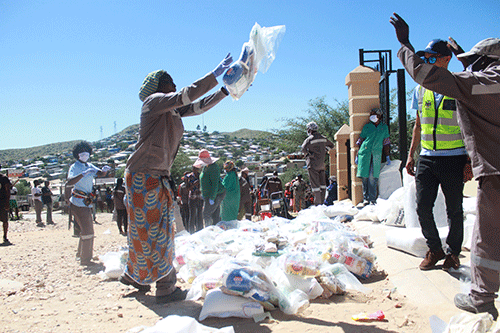After reviewing the roll-out and management of one of President Hage Geingob’s flagship poverty eradication programmes, the food bank, auditor general Junias Kandjeke found several shortcomings, including a complete disregard for the country’s procurement laws.
Apart from the Khomas region, the audit concluded the rest of the regions, on manual operation, risked the smooth distribution of food, as they stood a higher chance of duplicate distribution or outright theft.
The food bank was introduced to address hunger within urban
and peri-urban areas.
Kandjeke reviewed the food bank’s implementation over three financial years 2018/19, 2019/20 and 2020/21.
During the period under review, the social welfare minister was allocated N$5.3 billion to cater mainly for social safety nets, forming the first line of defence against poverty for the most vulnerable in society.
The monthly food parcels, valued at N$550 per month, were to supplement food provision in households. During the 2018/19-2019/20 financial years,
N$47.1 million was spent on the food bank programme. In the 2019/20-2020/21 financial year, N$37.9 million was used to purchase food parcels.
Meanwhile, under the 2020/21-2021/22 financial years, the amount surged to N$58.3 million.
In total, N$143.5 million was used on food parcels under the FBP.
His findings were tabled in the National Assembly for scrutiny last week.
Although the food bank was implemented in the 14 political regions, the auditors, due to, among others, lack of resources and time, only zeroed in on three regions.
They are Erongo (the last region where the food bank was implemented), Kavango West (where most beneficiaries reside) and Khomas.
The aim was to assess whether the Ministry of Gender Equality, Poverty Eradication and Social Welfare put adequate measures to effectively implement the food bank programme (FBP).
The audit also looked into the inadequate identification of suppliers, lack of records and ineffective control mechanisms.
“The audit could not determine whether all procurement actions adhered to the principles of competition, transparency, separation of duties, accountability and ethics due to incomplete or lack of documentary evidence submitted by the ministry. The ministry also did not enter into contracts with local suppliers as per the criteria,” Kandjeke found.
It is also the top auditor’s position that “the audit conducted an assessment of the procurement process of food parcels and noted some deviations from the criteria as per the food bank manual (2019) and the Procurement Act. Therefore, the audit concluded that the ministry did not fully adhere to the act, and partial adherence creates room for fraudulent activities/transactions around the food bank parcels.
“The audit also found that the ministry failed to prioritise the monitoring of the food bank programme because the ministry neglected to assess the effectiveness of the FBP on a regular basis,” the AG added.
The FBP was facilitated through the regional authorities, which coordinated communication between the ministry and communities, the storage of food at their respective constituencies and the recruitment of street committees.
A basic parcel should contain 500g of beans, 750ml sunflower oil, 2kg light brown sugar, 2.5kg bread flour, four instant dry yeast 10g, 500g salt, 500g lentils, 500g soup mix, corned mix Imbo, one laundry bar soap, six tinned fish and a bag of maize meal (10kg).
Way forward
Since May last year, the FPB transitioned into a conditional basic income grant (BIG).
“However, the auditors still recommend for the ministry to ensure the beneficiaries identified are indeed the rightful receivers of the basic income grant as intended by the Harambee Prosperity Plan II,” the auditor recommended.
In addition, the ministry was also directed to ensure sufficient and timely monitoring of the conditional BIG to determine progress on the socio-economic status of the beneficiaries and to address deviations proactively.
- emumbuu@nepc.com.na


